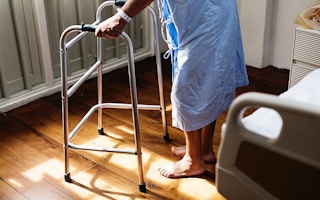When Covid-19 hit Ukraine, infectious diseases specialist Stepan Karabinyosh was at the center of the crisis. As he worked day after day in an intensive care unit, Karabinyosh found that his medical training had prepared him for the practical challenge of treating his patients, but not the emotional challenge of telling a growing number of them that, because of the risk of infecting their loved ones, they would most likely die without seeing them again.
But Karabinyosh was equipped for this experience better than many of his colleagues. He had taken additional training in palliative care – a multidisciplinary approach to optimising patient quality of life during severe and terminal illness.
Karabinyosh learned about the need for instruction in palliative care the hard way. Early in his career, he felt overwhelmed by the burden of dealing with seriously ill patients. Despite having little time to eat, he put on weight. He stopped talking to friends and family and did nothing but work and sleep.
Then, one day while he was taking x-rays of a woman in her 70s, she grabbed his hand and said: “Please do something, son. I am dying!” In that moment, he saw his own mother. He knew he needed to walk her through a medical procedure she might not survive, but it was difficult for him to have the conversation. He realised that if he wanted to keep working as a doctor, that had to change.
After receiving training in palliative care, those conversations became easier. He says the training helped him develop techniques for active listening, building rapport, and creating empathy. Crucially, palliative care training has helped him separate the person who needs support from the disease that needs treating. The ability to address patient fears was particularly important during the early days of the pandemic, when the best way to approach Covid-19 was still being determined and medical options were limited.
Palliative care also helps create a space for discussions about death when all medical options have been exhausted. Patients and their relatives often are unaware of the course diseases take. In such circumstances, palliative care aims to help them understand the prognosis and better prepare them for the end of life.
Although palliative care training is most closely associated with improving the quality of life of seriously and terminally ill patients, it also involves techniques to support healthcare workers as they cope with the emotional burden of their experience at work. It includes recommendations for self-care and psychological support, particularly for medical staff working in environments where they will regularly lose patients or confront the loss of patients they would not normally expect to die, like young people.
This kind of support is needed now more than ever. During the pandemic, healthcare workers have faced unprecedented levels of stress. Rates of burnout, depression, and anxiety among doctors, nurses, and physician assistants have exploded. One expert, writing in the medical journal The Lancet, noted that the toll on the profession is impeding the recovery from the pandemic and jeopardising global health care more generally.
Keeping experienced workers in the field is important for hospitals that are already short-staffed. And I and others in the field have observed that health-care workers with training and experience in palliative care have been better prepared to face these challenges and avoid burnout.
Many organisations, including my own, the International Renaissance Foundation, support initiatives to train more health-care workers in palliative care. With the support of the palliative care team of the Ivano-Frankivsk Center and the Mother Teresa Foundation, we have introduced free online webinars on grief and loss for health-care workers.
We have also conducted three practical courses for medical staff who worked throughout the pandemic. The program included psychological training, group and individual consultations with a psychologist and a chaplain, prayers, virtual tours, and art programs. More than 50 healthcare workers participated in the courses, and all of them noted a stabilisation of their psycho-emotional state and better sleep patterns.
But much more needs to be done. To prepare for future pandemics and provide better care generally, palliative care should be fully integrated into health insurance and become a standard part of training. Medical staff should do rotations in palliative care to obtain practical experience. As health-care strategies are reevaluated in light of Covid-19, palliative care should be recognised as a vital part of the therapeutic process.
Kseniia Shapoval is a public health program manager at the International Renaissance Foundation.
Copyright: Project Syndicate, 2020.
www.project-syndicate.org











